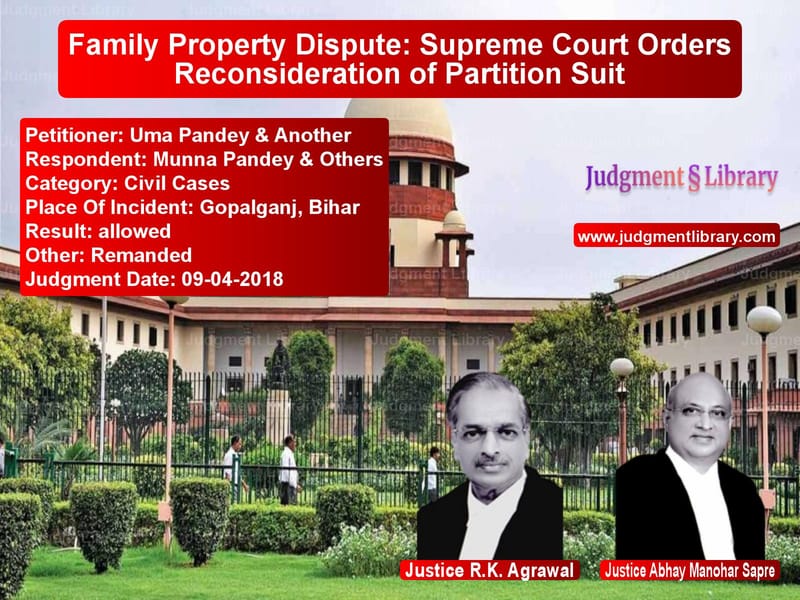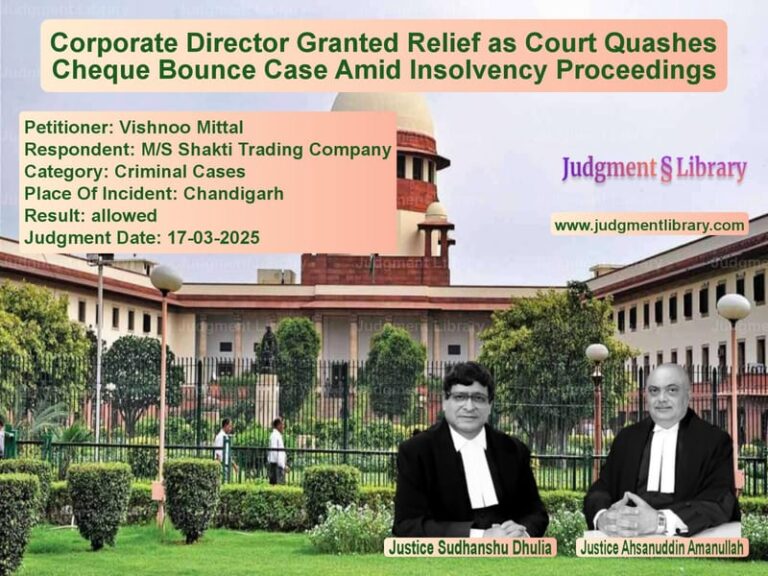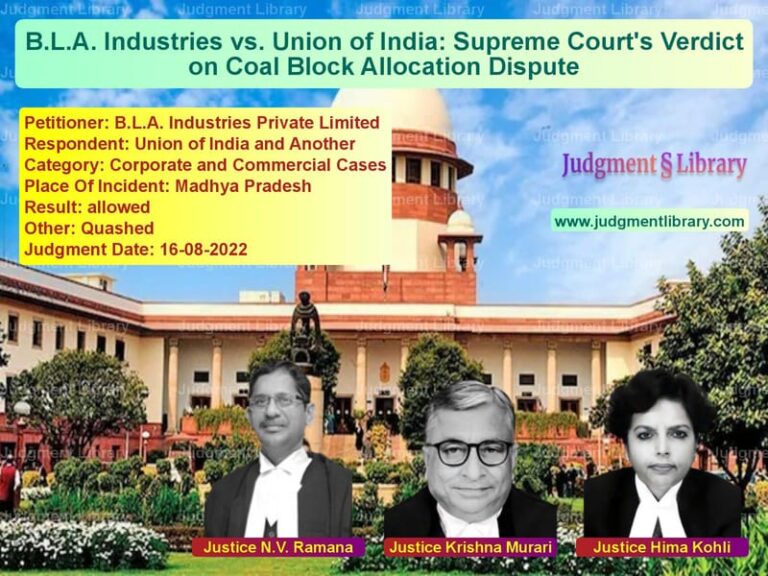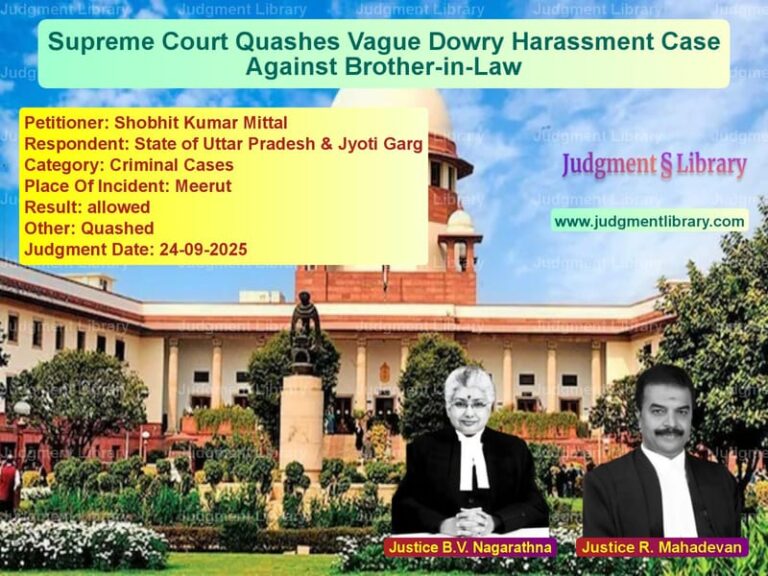Family Property Dispute: Supreme Court Orders Reconsideration of Partition Suit
The case of Uma Pandey & Anr. vs. Munna Pandey & Ors. revolves around a long-standing family dispute regarding the partition of ancestral agricultural land in Bihar. The appellants, who were plaintiffs in the original suit, sought their rightful share in the property, claiming that the land was part of their joint family inheritance. The respondents, who were defendants, contested this claim, arguing that the property had already been partitioned earlier.
The matter was initially decided by the trial court in favor of the appellants, but the decision was overturned in appeal. The High Court subsequently dismissed the second appeal in limine without framing any substantial question of law. The appellants then approached the Supreme Court, seeking reconsideration of their claims.
Background of the Case
The appellants filed Title Suit No. 21 of 1993 in the Sub-Judge Court, Gopalganj, Bihar, claiming their share in ancestral agricultural land. They contended that the suit property was part of an undivided family estate and sought partition and separate possession of their rightful portion.
The respondents, who were members of the same family, contested the suit on multiple grounds. They argued that the land had already been partitioned through a family arrangement and that the appellants had no claim over it. The trial court, after examining the evidence, ruled in favor of the appellants and granted them a share in the land.
The respondents then filed an appeal before the First Additional District & Sessions Judge, Gopalganj, which was allowed, and the trial court’s decree was set aside. The appellants’ second appeal before the Patna High Court was dismissed in limine, with the court ruling that no substantial question of law arose for consideration. Aggrieved by this, the appellants approached the Supreme Court.
Key Legal Issues
- Whether the High Court erred in dismissing the second appeal without framing substantial questions of law.
- Whether the property in dispute was ancestral and subject to partition or had already been divided earlier.
- Whether the lower appellate court’s findings regarding an alleged prior partition were legally sustainable.
- Whether a document (Exhibit A) relied upon by the respondents was properly interpreted by the lower courts.
Arguments by the Appellants (Uma Pandey & Another)
- The appellants argued that the High Court failed to exercise its jurisdiction properly by dismissing the second appeal in limine without framing substantial questions of law.
- They contended that the property was joint family property and had not been partitioned.
- The appellants challenged the reliance placed by the lower appellate court on Exhibit A, claiming that it was not a legally valid document to establish prior partition.
- They maintained that they were deprived of their rightful share due to erroneous findings by the first appellate court.
Arguments by the Respondents (Munna Pandey & Others)
- The respondents maintained that the land in question had already been partitioned before the appellants filed their suit.
- They argued that the first appellate court had correctly examined the evidence, including Exhibit A, which established that the property had been divided earlier.
- The respondents contended that the High Court rightly dismissed the second appeal, as no substantial questions of law were involved.
- They asserted that the trial court’s decision was incorrect and that the first appellate court had properly rectified the error.
Supreme Court’s Observations
The Supreme Court carefully examined the arguments and the legal record and made the following key observations:
- The High Court erred in dismissing the second appeal in limine. Under Section 100 of the Civil Procedure Code (CPC), a second appeal must be entertained if substantial questions of law arise.
- Interpretation of a legal document such as Exhibit A and its impact on property rights constitutes a substantial question of law.
- The High Court failed to examine whether the first appellate court’s findings on partition were legally and factually sustainable.
- The case involved crucial legal questions regarding ancestral property and the validity of documentary evidence, which warranted a full hearing.
Final Judgment
The Supreme Court ruled in favor of the appellants and set aside the High Court’s dismissal of the second appeal. The key directives were:
- The second appeal was remanded to the Patna High Court for fresh consideration on its merits.
- The High Court was directed to frame and decide substantial questions of law arising in the case.
- The judgment of the first appellate court was not reinstated, meaning the appellants’ claim remained open for adjudication.
- The High Court was requested to expedite the hearing and resolve the matter within six months.
Legal Significance of the Judgment
This judgment reinforces the principle that second appeals must be decided based on substantial questions of law rather than being dismissed outright. The ruling establishes that:
- High Courts must carefully evaluate whether a case involves legal interpretation before rejecting a second appeal.
- Partition disputes require detailed scrutiny, especially when documentary evidence is contested.
- Substantial questions of law, particularly regarding the interpretation of documents affecting property rights, warrant full judicial consideration.
- Parties cannot be denied their rightful claims merely because an appellate court finds a different view based on facts alone.
Impact on Future Cases
The Supreme Court’s decision will impact numerous property disputes involving ancestral land and partition claims. It clarifies that courts must ensure procedural justice by framing and deciding substantial questions of law when required. This ruling serves as a precedent for future cases where second appeals involve significant legal questions affecting inheritance and property rights.
Petitioner Name: Uma Pandey & Another.Respondent Name: Munna Pandey & Others.Judgment By: Justice R.K. Agrawal, Justice Abhay Manohar Sapre.Place Of Incident: Gopalganj, Bihar.Judgment Date: 09-04-2018.
Don’t miss out on the full details! Download the complete judgment in PDF format below and gain valuable insights instantly!
Download Judgment: Uma Pandey & Another vs Munna Pandey & Other Supreme Court of India Judgment Dated 09-04-2018.pdf
Direct Downlaod Judgment: Direct downlaod this Judgment
See all petitions in Property Disputes
See all petitions in Succession and Wills
See all petitions in Judgment by R K Agrawal
See all petitions in Judgment by Abhay Manohar Sapre
See all petitions in allowed
See all petitions in Remanded
See all petitions in supreme court of India judgments April 2018
See all petitions in 2018 judgments
See all posts in Civil Cases Category
See all allowed petitions in Civil Cases Category
See all Dismissed petitions in Civil Cases Category
See all partially allowed petitions in Civil Cases Category







